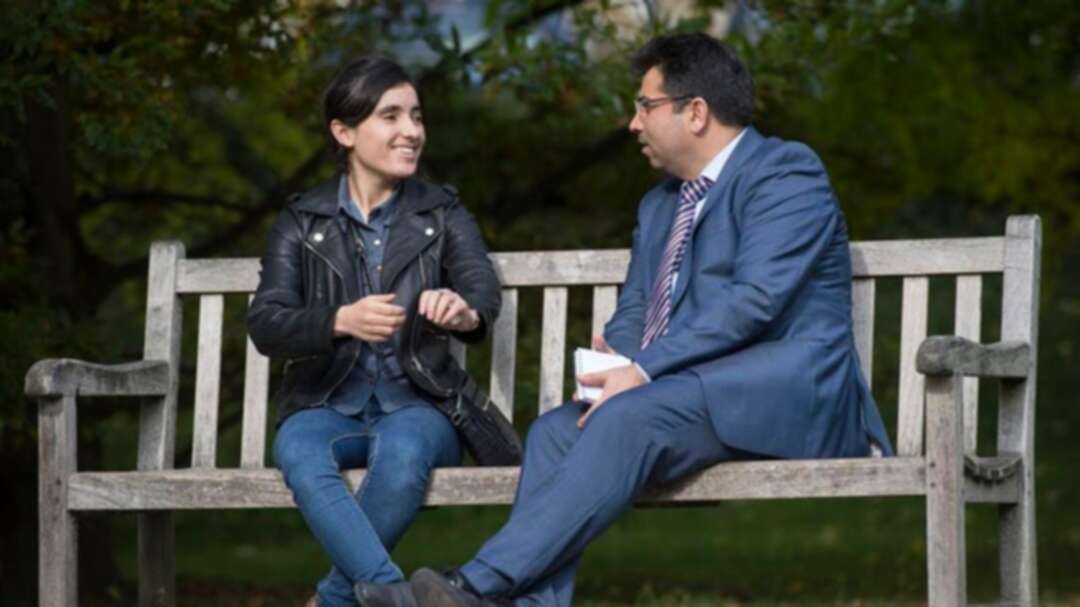-
Yazidi doctor awarded for his work helping women calls for justice

Yazidi families would not feel safe returning to their homes in Iraq until ISIS extremists accused of atrocities against the religious minority face justice, according to a doctor awarded on Saturday for his work with Yazidi women and children.
Mirza Dinnayi, a Yazidi activist named the winner of the Aurora humanitarian prize for helping 1,000 Yazidi women and children seek medical treatment in Europe, said prosecutions were key to help the “completely traumatized” community.
“Yazidis need to trust the authorities in Iraq in order to establish peace and make a process of reconciliation and transitional justice. This has not happened,” said Dinnayi.
ISIS rampaged through the Yazidi religious community’s heartland in Sinjar, northern Iraq, in 2014, slaughtering thousands of people, in what the United Nations has called a genocide.
About 7,000 women and children were kidnapped to become sex slaves or fighters. Almost 3,000 of them remain unaccounted for, according to community leaders.
ISIS was driven out of the region in 2017, but many Yazidis still live in camps, afraid to return.
Some militants have faced trial in Iraq but on charges of belonging to a terrorist group rather than for alleged war crimes and genocide – something that has fueled a sense of distrust in authorities among the Yazidi community, Dinnayi said.
“The recognition of genocide is the first step in order to satisfy the victims,” he told the Thomson Reuters Foundation in a phone interview from Armenia where the award ceremony was held.
The problem was exacerbated by Iraqi laws allowing rapists to avoid prosecution by marrying their victims and the lack of a specific crime for sexual slavery, Dinnayi said.
The 46-year-old added he was also concerned that a recent Turkish offensive against Kurdish forces in neighboring Syria could further hamper efforts to see justice done, by providing extremists jailed there with a “big opportunity” to escape.
Kurdish officials have said almost 800 ISIS-affiliated foreigners, many of them women and children, escaped from a camp after the Turkish incursion began last week.
There are also fears that extremists held in jails in Kurdish-controlled areas of northern Syria could flee.
Dinnayi, who lives in Germany, was awarded the $1 million prize for his work helping more than 1,000 Yazidi women and children seek medical treatment in Europe.
The prize money would go to his organization, Air Bridge Iraq, and two other aid groups helping people who suffered at the hands of ISIS extremists, he said.
The Aurora prize runner-ups were Zannah Mustapha, a lawyer who set up a school for children affected by violence in northeastern Nigeria, and Yemeni lawyer Huda Al-Sarari, who investigated human rights abuses in the war-torn country.
The annual Aurora Prize for Awakening Humanity was founded by Armenia-based 100 LIVES, a global initiative that commemorates a 1915 massacre in which up to 1.5 million Christian Armenians were killed by Ottoman Muslims.
You May Also Like
Popular Posts
Caricature
BENEFIT Sponsors BuildHer...
- April 23, 2025
BENEFIT, the Kingdom’s innovator and leading company in Fintech and electronic financial transactions service, has sponsored the BuildHer CityHack 2025 Hackathon, a two-day event spearheaded by the College of Engineering and Technology at the Royal University for Women (RUW).
Aimed at secondary school students, the event brought together a distinguished group of academic professionals and technology experts to mentor and inspire young participants.
More than 100 high school students from across the Kingdom of Bahrain took part in the hackathon, which featured an intensive programme of training workshops and hands-on sessions. These activities were tailored to enhance participants’ critical thinking, collaborative problem-solving, and team-building capabilities, while also encouraging the development of practical and sustainable solutions to contemporary challenges using modern technological tools.
BENEFIT’s Chief Executive Mr. Abdulwahed AlJanahi, commented: “Our support for this educational hackathon reflects our long-term strategic vision to nurture the talents of emerging national youth and empower the next generation of accomplished female leaders in technology. By fostering creativity and innovation, we aim to contribute meaningfully to Bahrain’s comprehensive development goals and align with the aspirations outlined in the Kingdom’s Vision 2030—an ambition in which BENEFIT plays a central role.”
Professor Riyadh Yousif Hamzah, President of the Royal University for Women, commented: “This initiative reflects our commitment to advancing women in STEM fields. We're cultivating a generation of creative, solution-driven female leaders who will drive national development. Our partnership with BENEFIT exemplifies the powerful synergy between academia and private sector in supporting educational innovation.”
Hanan Abdulla Hasan, Senior Manager, PR & Communication at BENEFIT, said: “We are honoured to collaborate with RUW in supporting this remarkable technology-focused event. It highlights our commitment to social responsibility, and our ongoing efforts to enhance the digital and innovation capabilities of young Bahraini women and foster their ability to harness technological tools in the service of a smarter, more sustainable future.”
For his part, Dr. Humam ElAgha, Acting Dean of the College of Engineering and Technology at the University, said: “BuildHer CityHack 2025 embodies our hands-on approach to education. By tackling real-world problems through creative thinking and sustainable solutions, we're preparing women to thrive in the knowledge economy – a cornerstone of the University's vision.”
opinion
Report
ads
Newsletter
Subscribe to our mailing list to get the new updates!






















